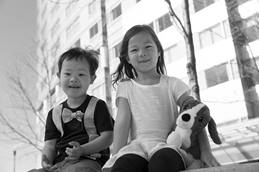Food Allergy Treatment Center
Food allergies impact the lives of millions of children and their families. At Nationwide Children’s Hospital's Food Allergy Treatment Center, our team of experts understands how food allergies can affect so many aspects of daily living.
Our center provides all-inclusive and patient-specific care for children with suspected or confirmed food allergies. Our team offers:
- Comprehensive evaluation to establish or rule out a food allergy diagnosis
- Education regarding risks and avoidance strategies
- Management for children of all ages, including those starting school for the first time or adolescents transitioning to independent living
- Psychosocial support for every patient
We conduct more oral food challenges, which is the best way to help families truly understand their child’s individual risk for reaction, than any center in our region. Treatment options, including oral immunotherapy and clinical research trials, are also available for interested families.
At the Nationwide Children’s Hospital Food Allergy Treatment Center, we recognize that food allergy management is NOT one size fits all. We work with each family to meet their individual needs and empower them to confidently manage their child’s food allergies.
Our Treatment Approach
At the Food Allergy Treatment Center, treatment means much more than giving medicine or immunotherapy. We firmly believe in providing families with evidence-based information to help each parent and child make decisions with the best information available. The understanding of food allergy has changed dramatically in recent years and we pride ourselves on offering the latest information and treatment approach to every family.
We recognize each child is unique, and each family may adopt a different approach. Successful food allergen avoidance management is not one size fits all and requires the development of skills to help navigate our world with confidence and empowerment.
- Treatment begins with establishing the correct diagnosis and avoiding the foods that pose risk for a reaction. Our team has seen the negative impact that misdiagnosis of food allergy can have on families and will take time to discuss how to properly diagnose food allergies.
- Treatment also includes providing education and helping families develop the necessary skills to manage their child’s food allergies on a daily basis. Confidence grows through experience and we treat a lack of experience through role playing, reviewing situations and proximity challenges for those concerned about casual exposures causing severe reactions.
- We treat anxiety through our multidisciplinary approach with psychologists, counselors, child life personnel and a dedicated recognition of how impactful this can be for each family.
- We will also treat the entire patient and offer recommendations on how best to control eczema, allergic rhinitis, asthma and any allergic condition.
Services We Offer
Our team treats only kids and teens, using the latest testing and diagnosis tools to find out exactly what foods are causing reactions. Whether it’s peanuts, milk, eggs, or something else, we use safe, kid-friendly tests to get answers fast.
Once we know what your child is allergic to, we create a care plan just for them. Every child is different, so we take the time to learn about their needs, lifestyle, and health. We offer the newest treatment options, including cutting-edge oral immunotherapy (OIT), which helps some kids build tolerance to certain foods over time.
Our goal is to keep your child safe—and help them live a full, happy life. With a caring team, the latest science, and a focus on each child as an individual, we’re here to support your family every step of the way.



Why Choose Us?
We built our Food Allergy Treatment Center for you. We are here to support you every step along your journey, from scheduling your first appointment to returning phone calls and messages in a timely fashion. Our team is always on the cutting edge of the latest advances and we are constantly updating our approach, all for the benefit of our patients and families. Our faculty includes leaders in the field who bring their expertise to our center.
Leading the Way to New Treatments and Outcomes Through Clinical Research
Clinical care and research work together. This helps scientists and doctors to find new treatments and therapies. Clinical studies (also called clinical trials) will continue to become more common in daily care at Nationwide Children's. Clinical studies help doctors learn more about conditions and treatment.
The physicians at Nationwide Children’s work with other medical professionals and scientists to develop new treatments, improve quality of life and raise the standards of care for children with allergies. This means you might hear about a clinical study that your child might be able to join. This does not mean that your child has to join a study. You always have the choice about whether or not to join a study.
Support For Your Family
Family Resource Library
Our family resource library includes videos and blog posts to help you learn more, meet the team and prepare for your next clinic appointment.
Psychosocial Support
Our center recognizes the burden families face in trying to avoid accidental ingestion. Our team spends time with every family to help them understand their child’s individual risk of reaction from various exposures and scenarios. We understand how scary it can be for a parent to watch their child eat lunch next to another child who is eating their food allergen and work with them to balance the perceived risk of reaction with actual risk.
Anxiety is real and can dramatically impact how food allergy families function on a daily basis. Many families with high levels of anxiety choose to restrict their social activities, travel or dining at restaurants. Our team takes time with each family to address these concerns and identify areas where anxiety may shift from being useful (remembering to carry your child’s epinephrine device) to unhelpful (not flying on an airplane due to fear of a reaction from airborne exposure).
We have child life specialists who help during visits and food challenges as well as psychologists and counselors to help families develop long term strategies toward positively managing their child’s food allergies.
Transition Programs
The Director of our Center, Dr. Stukus, wrote the first book specifically addressing the challenges adolescents with allergic conditions face during their transition to independent living. Our Center focuses on helping families transition through various situations.
Whether it’s sending your toddler to preschool, your child to summer camp or a teenager who is leaving home for college, we have structured programs to help families navigate these specific challenges. We recognize the stress these situations can cause and walk families through every step, including ways to communicate with necessary school personnel or other caregivers. We also feel it is very important to involve the child and teenager in this process. Confidence grows through practice and we will help every family practice and prepare for these important life changes.
Social Support
While we enjoy every moment we spend with families and their children, we realize our medical team plays only a limited role in their life. Social support is an important part of the food allergy community. Whether it’s sharing allergen free recipes, discussing important issues such as epinephrine injector shortages, or just having support from another family who knows what it’s like to live with food allergies, our Center has developed a social program that families can elect to participate in. We can also help guide families towards reputable and trustworthy online resources.
Provider Resources
Quality Improvement Initiatives
Nationwide Children's Hospital is one of the leading pediatric academic institutions in Quality Improvement. The Food Allergy Treatment Center utilizes data to understand areas that can benefit from improvement and employs structured quality improvement methodology to demonstrate improvement in specific areas. This is a significant part of how we strive to deliver the best clinical care possible.
Recent quality improvement efforts helped us increase our capacity to offer oral food challenges, utilize educational resources for infants and toddlers with a new diagnosis of cow’s milk allergy and assess health literacy among caregivers.
Advocacy
Our medical experts participate in advocacy efforts outside of our clinical setting.
- Dr. Grayson serves on the Board of Directors for the Asthma and Allergy Foundation of America.
- Dr. Stukus is very active on social media, where he uses his @AllergyKidsDoc account to provide evidence based information and dispel myths and misconceptions.
- Our medical experts also helped pass legislation in Ohio allowing schools to stock epinephrine autoinjectors and albuterol to use on any student, not just those who have their own prescriptions.
- Our allergists also worked with the laboratory services at Nationwide Children's Hospital to eliminate the use of all food allergen blood panels, which are a leading cause of misdiagnosis of food allergy.
These are just a few examples of how our team is dedicated to improving the lives of all children with food allergies and allergic conditions, not just the ones we see in person.
Clinical Tools
Download Our Clinical Tool: When and How to Evaluate for a Peanut Allergy




